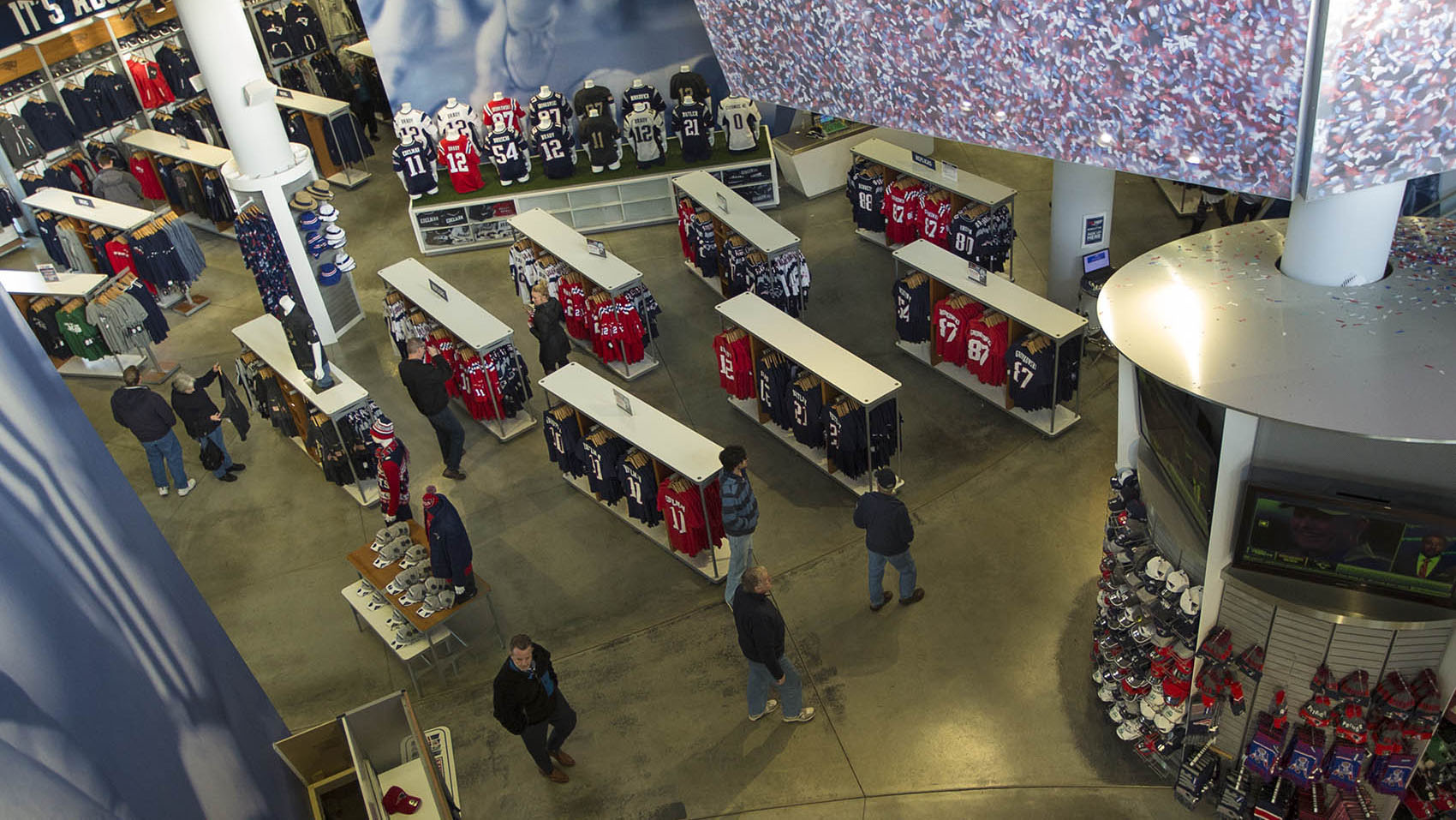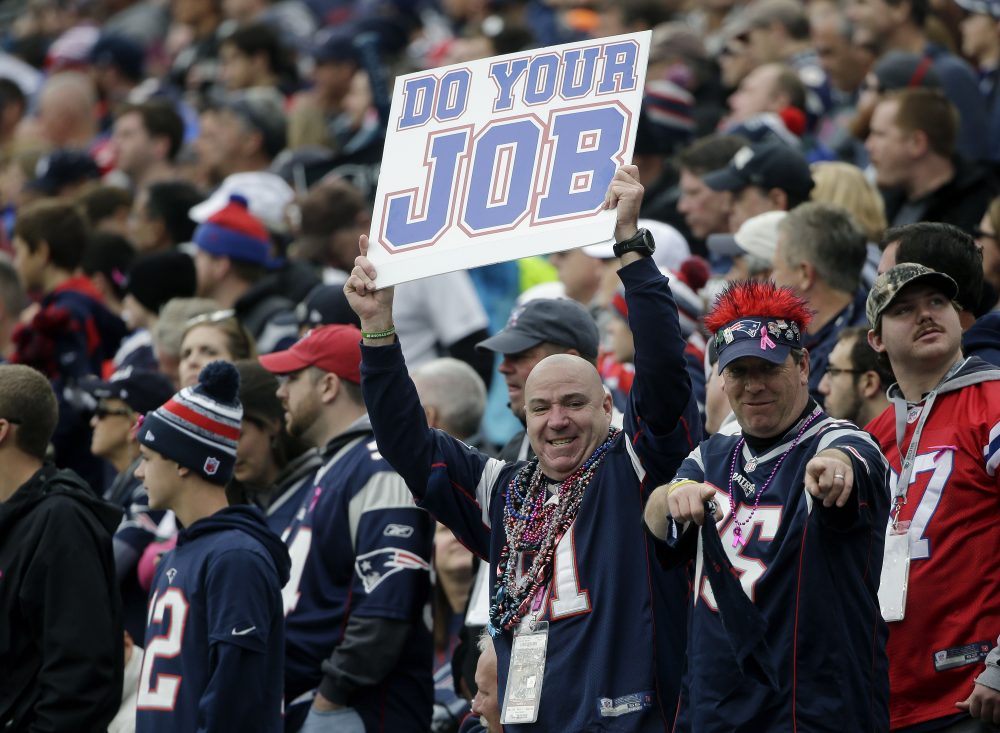Advertisement
How The Patriots Use Data To Try To Improve The Fan Experience
Resume
With the Patriots nearing another win, the Gillette Stadium crowd lets loose. More than 66,000 fans chant and cheer in unison.
To the number-crunchers at the Kraft Analytics Group — commonly known as KAGR -- this is more than a rowdy sea of people in Tom Brady jerseys and other Patriots apparel. It’s a treasure trove of data.
KAGR tracks and quantifies all sorts of fan behavior, cataloging everything from Pro Shop purchases to when fans buy game tickets, to whether they read emails the team sends.
“The underlying goal is really to understand who our customers are and what they want, to give them a better experience,” says KAGR CEO Jessica Gelman.
Gathering as much information as possible, she adds, helps the Patriots make better decisions about ticket prices, game-day staffing, stadium improvements and various other areas that impact fan experience. The team also uses KAGR data to forecast when fans will pull into stadium parking lots and how many ticket-holders will actually show up for each game.
In her Gillette Stadium office, Gelman displays a seating chart on a large TV monitor. For every home game, she can look at every seat in the stadium and call up detailed information about who purchased it and when it went unused. And she can pull that type of information for the last five seasons.

While every game is a sellout, some ticket-holders don’t show. Patriots president Jonathan Kraft finds it valuable to know which ones and why.
“[The] front rows of sections, which I intuitively thought would have been very attractive, really aren’t,” Kraft says.
He adds: “If somebody misses a game, they get a communication from us and we start to aggregate the reasons why people miss one, two, three games. At the end of the year, I can know everything that took place with our ticket-holders during that season. It’s incredibly valuable to adjust your strategy going forward depending on what your goals are.”
One big goal is fan loyalty. It’s easy to keep fans in the fold with playoff berth after playoff berth, as the Patriots have done during the Tom Brady-Bill Belichick era. But it won’t always be that way. And Kraft is planning for the down years.
“We know that when that turns — and, hopefully, it doesn’t turn for a really, really long time -- that we’ll have built up a really strong relationship on points that go just beyond the wins and losses to keep the people engaged and a part of our active fan base,” Kraft says.
“I understand how some people might think it’s Big Brother-ish, but I think in reality it’s allowing us to serve our fans, the people that love our team...”
Jonathan Kraft, Patriots president
That kind of foresight made the Patriots interested in doing more with fan analytics. The team first explored data gathering and warehousing options 15 years ago. Then, under Gelman’s guidance, the Patriots developed new techniques and technologies to learn as much as possible about their customers. In May, the Foxborough-based Kraft Sports Group launched KAGR. Now, KAGR counts the Patriots and the New England Revolution among its clients.
The 23-person KAGR staff figures out what data to mine and how to visualize it in a very low-tech way. Brainstorming starts with multicolored post-it notes. Gelman and her staff shuffle around notes with phrases like “Unsold Inventory,” “Renewal Rate,” Sales Forecasting” and “Value to Organization.”
“The Holy Grail is you want to know every person that’s been in your building and you want to know every person who’s come to your website,” Gelman says. “And you want to have them as people that you can communicate with on a daily basis.”
But are Patriots fans comfortable having the team they follow also follow them? Kraft thinks they are.
“Ultimately, people have chosen to engage with us because there’s something about our organization and our business that they like,” Kraft says. “Some people might think it’s Big Brother-ish, but I think in reality it’s allowing us to serve our fans, the people that love our team, in a way that they want to be serviced.”

A good example of that is how the Patriots promoted “Do Your Job.” The Belichick mantra became a popular slogan leading up to the Pats' victory in Super Bowl XLIX. Gelman says that her team’s breakdowns of social media mentions and Pro Shop purchases indicated that the slogan was catching on more than expected. So the Patriots pushed it on variety of platforms, from merchandise to a sweepstakes for playoff tickets. It was all designed to engage more people.
“That’s a very good example of finding a small kernel of something that seems to be resonating and putting more power behind it,” Gelman says.
Now, KAGR wants to find small kernels like that for clients. It’s offering to help pro sports franchises and colleges collect and analyze data about their fans.
And Kraft hopes to have lots of KAGR customers.
“We can help people who are in the industry who are smart but don’t have these tools to quickly put the technology to work for them, driving incremental revenue, driving more fan engagement, driving growth of your fan base,” Kraft says. “We can do any and all of those things and more.”
A few months ago, KAGR signed Mississippi State University, its first client outside the Kraft Sports Group. Before the new year, KAGR says it expects to add two professional sports teams to its client roster.
This segment aired on December 22, 2016.
